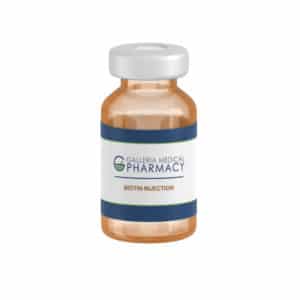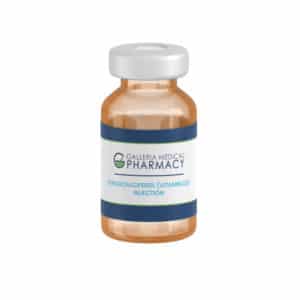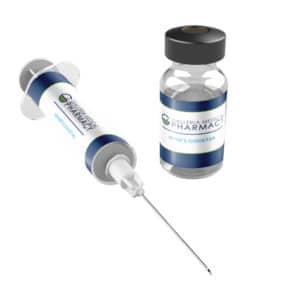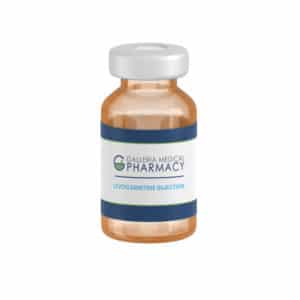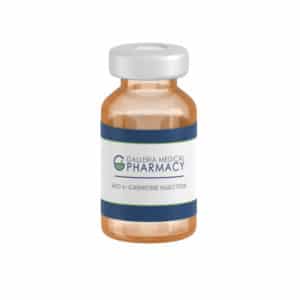Glutathione Injection
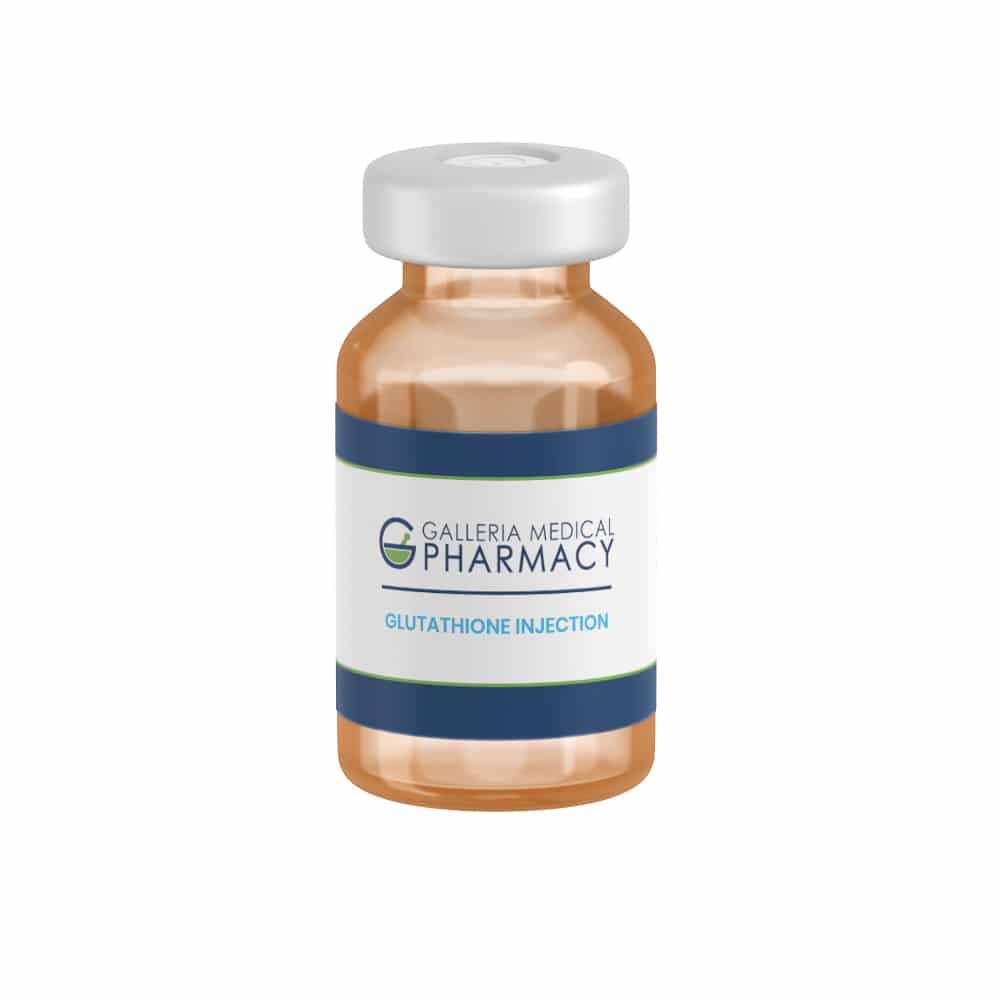
Overview
Glutathione is present naturally in every cell of the body and is one of the most potent antioxidants and cell-protecting agents produced. Its highest concentration is in the liver and it is distributed to other parts of the body through the blood stream.
Glutathione is composed of three amino acids: L-cysteine, L-glutamic acid, and glycine. The molecular formula of the compound is C10H17N3O6S, and its molecular weight is 307.321 g/ mol.1 The presence of sulfur atoms is the reason for its strong sulfur odor and potent antioxidant properties. Glutathione has the following structural formula:
Glutathione is an essential molecule required for cellular detoxification. During the body’s normal functioning, an excess of toxic oxygen-containing molecules called reactive oxygen species (ROS) are produced. These molecules are typically very reactive with other molecules they come in contact with. There is a tendency of ROS to bind or destroy DNA or other important biomolecules. Glutathione acts by assisting the body in the removal of ROS. It has a sulfhydryl (SH) group on the cysteinyl portion of the molecule, which accounts for its strong electron-donating character to neutralize the ROS. Thus, glutathione is an essential cofactor for many enzymes that require thiol-reducing equivalents, and helps keep redox-sensitive active sites on the enzyme in the necessary reduced state. Higher-order thiol cell systems, the metallothioneins, thioredoxins and other redox regulator proteins are ultimately regulated by glutathione levels and the redox ratio. The ratio balance is crucial to homeostasis, stabilizing the cellular biomolecular spectrum, and facilitating cellular performance and survival.2
Glutathione injection has been used in clinical practice as an antioxidant, immune booster, and detoxifier. It has been studied to treat symptoms of neurodegenerative diseases such as Parkinson’s,3 Alzheimer’s,4 multiple sclerosis,5 ALS,6 irritable bowel,7 exercise induced oxidative stress,8 and non-insulin dependent diabetes.9, 10 Glutathione injection has also been considered to treat toxicities from side effects of chemotherapy and radiation therapy.11, 12 Glutathione when formulated as a cream or gel has been used topically for skin lightening and in certain cosmetics.13, 14
Indications
*
How Supplied
This preparation is not commercially available at this time. Patients that would benefit from its administration may be prescribed Glutathione Injection as determined by a health care provider. The most popular formulation compounded at Galleria Medical Pharmacy is Glutathione 200mg/mL Injection, though other strengths and formulations may be available upon request.
Storage
Glutathione degrades rapidly at room temperature. Store glutathione vials in a refrigerator between 35°F to 46°F (2°C – 8°C). Protect From Light. Keep all medicine out of the reach of children. Throw away any unused medicine after the beyond use date. Do not flush unused medications or pour down a sink or drain.
Reference
- The Merck Index, 15th edition.
- Snoke JE, Bloch K. “Studies on mechanism of action of Glutathione Synthetase.” Journal of Biological Chemistry. 1955; 213(2):825-35.
- Sechi G, et al. “Reduced intravenous glutathione in the treatment of early Parkinson’s disease.” Prog Neuropsychopharmacol Biol Psychiatry. 1996; 20:1159-70.
- Saharan S, Mandal PK. “The emerging role of glutathione in Alzheimer’s disease.” J Alzheimer’s Dis. 2014;40(3):519-29.
- Ferreira B, et al. “Glutathione in multiple sclerosis.” Br J Biomed Sci. 2013;70(2):75-9.
- Liying Chi, et al. “Depletion of Reduced Glutathione Enhances Motor Neuron Degeneration in vitro and in vivo.” Neuroscience. 2007 Feb 9; 144(3): 991-1003.
- Lacy BE, et al. “The Treatment of Irritable Bowel Syndrome.” Therap Adv Gastroenterol. 2009 Jul;2(4):221-38.
- Chad Kerksick, Chad, Willoughby, Darryn. “The Antioxidant Role of Glutathione and N-Acetyl-Cysteine Supplements and Exercise-Induced Oxidative Stress.” J Int Soc Sports Nutr. 2005 Dec 9;2(2):38-44.
- De Mattia G, Bravi MC, Laurenti O, et al. “Influence of reduced glutathione infusion on glucose metabolism in patients with non-insulin-dependent diabetes mellitus.” Metabolism. 1998; 47:993-7.
- Samiec PS, et al. “Glutathione in human plasma: decline in association with aging, age-related macular degeneration, and diabetes.” Free Radic Biol Med. 1998; 24:699-704.
- Traverso, Nicola, et al. “Role of Glutathione in Cancer Progression and Chemoresistance.” Oxid Med Call Longev. 2013;2013:972913.
- Ganesaratnam K. Balendiran, Rajesh Dabur, Deborah Fraser. “The role of glutathione in cancer.” Cell Biochemistry & Function. 11 August 2004.
- Sinee Weschawalit, et al. “Glutathione and its antiaging and antimelanogenic effects.” Clin Cosmet Investig Dermatol. 2017; 10: 147-153.
- Kadam Vaishali, et al. “Cosmeceuticals an emerging concept.” IJRPC. 2013, 3(2).
- Hauser RA, et al. “Randomized, double-blind, pilot evaluation of intravenous glutathione in Parkinson’s disease.” Move Disord. 2009 May 15;24(7):979-83.
Compounding Pharmacy Statement
Glutathione injection is compounded with drug components whose suppliers are registered with the FDA. While Galleria Medical Pharmacy adheres to USP <797> guidelines and applicable state and federal regulations to meet the required quality standards, the statements made regarding compounded glutathione injection have not been evaluated by the FDA for safety or clinical effectiveness. As such, this preparation is not intended to diagnose, treat, cure, or prevent any disease. For inquiries concerning this preparation, please contact (504) 267-9876.
